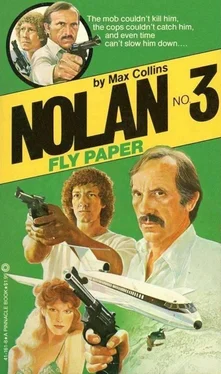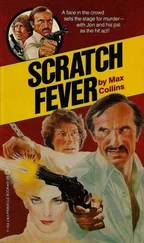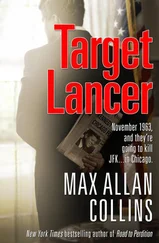Max Collins - Fly Paper
Здесь есть возможность читать онлайн «Max Collins - Fly Paper» весь текст электронной книги совершенно бесплатно (целиком полную версию без сокращений). В некоторых случаях можно слушать аудио, скачать через торрент в формате fb2 и присутствует краткое содержание. Город: New York, Год выпуска: 1981, Издательство: Pinnacle Books, Жанр: Криминальный детектив, на английском языке. Описание произведения, (предисловие) а так же отзывы посетителей доступны на портале библиотеки ЛибКат.
- Название:Fly Paper
- Автор:
- Издательство:Pinnacle Books
- Жанр:
- Год:1981
- Город:New York
- ISBN:нет данных
- Рейтинг книги:4 / 5. Голосов: 1
-
Избранное:Добавить в избранное
- Отзывы:
-
Ваша оценка:
- 80
- 1
- 2
- 3
- 4
- 5
Fly Paper: краткое содержание, описание и аннотация
Предлагаем к чтению аннотацию, описание, краткое содержание или предисловие (зависит от того, что написал сам автор книги «Fly Paper»). Если вы не нашли необходимую информацию о книге — напишите в комментариях, мы постараемся отыскать её.
Fly Paper — читать онлайн бесплатно полную книгу (весь текст) целиком
Ниже представлен текст книги, разбитый по страницам. Система сохранения места последней прочитанной страницы, позволяет с удобством читать онлайн бесплатно книгу «Fly Paper», без необходимости каждый раз заново искать на чём Вы остановились. Поставьте закладку, и сможете в любой момент перейти на страницу, на которой закончили чтение.
Интервал:
Закладка:
“You will cover for me,” he said. “Make sure none of the floor-walkers or sales people see me.”
“But Ken... this is crazy.”
She looked across the sea of cars — it was Saturday, and the only parking space they’d found was at the rear of the endless lot — and even from this distance the store looked gigantic, some grotesque national monument to commercialism. Though the massive building was a pinkish brick, its face was primarily steel-trimmed glass, topped with enormous neon letters that said BARGAIN CITY. She knew, without ever having been in there, that those rows and rows of doors would open onto an entryway big enough to put their house in, an entryway lined with bubble gum machines and armed guards.
Wasn’t Saturday the worst possible day to go shoplifting? All those people? All those people were precisely why Saturday was ideal, Ken said; there’d be too many people for store personnel to keep track of. Carol didn’t quite buy that line of reasoning, either, but she went along with Ken. When push came to shove, she always went along with Ken.
She realized it wasn’t stylish these days to let your husband — or any man — control your life. But she wasn’t a liberated woman, and had no desire to be one. That point of view came from being the last of six children, she supposed, all the rest of whom were boys. She’d been the little sis, and she and her mother had lived in the shadow of her father and his five sons. And it hadn’t been so bad. Being the only sister of five brothers had plenty of advantages, and she was the baby of the family besides and accordingly was awarded extra attention: on a holiday, she’d get more gifts, more kisses, than anyone.
Still, a big part of her childhood had been learning to keep her place. As the youngest child, you learned that anyway, and as the youngest and a girl, you got used to having your life controlled for you; your decisions made for you; your thinking done for you. You got used to having men dominate your world.
Ken had been just the kind of man she was used to. They’d met at a junior college in their hometown, in downstate Missouri, and he had been the firm but gentle sort of guy she’d been looking for, always. It hadn’t been hard to grab him; she was aware of her good looks, and Ken was a loner whose nonconformist ways had turned off most of the girls he’d dated — he’d rather spend Friday night working on some electronics project than at a movie, say, or a dance. He had a quiet strength she liked, and he was cute, and while he wasn’t thoughtful, he certainly wasn’t cruel. Besides, she was used to having self-centered men around her. Wasn’t that the way of all men? The ones worth having, anyway.
There was a side to Ken that bothered her, when she got to know him better; but she’d cherished the flaw in him, rather than rejected him because of it. By the time she noticed his weak spot, she was already hopelessly in love with him, so her reaction was positive: the flaw in Ken was something she could, in her quiet way, help him with; she could give him the encouragement to overcome his one weakness.
His weakness was that he had a tendency not to finish things. He had a fine mind, brilliant, really; he could do most anything. But his mind moved so quickly, his enthusiasm shifted so rapidly, that he often did not complete what he’d started. He’d flunked out of the junior college, primarily because he had no interest in the subjects he was taking, and one just doesn’t flunk out of J.C. — J.C. is where a person goes ’cause he might flunk out (or already had ) someplace else.
After they were married, Ken had gone to Greystoke Teacher’s College, while Carol worked as a secretary and helped put him through, and he finally graduated after an extra semester. Greystoke was an expensive school that ate up much of what Ken’s parents had left him, not to mention most of Carol’s weekly paycheck; but Greystoke was a special sort of college, a school for students who hadn’t hacked it elsewhere, an educational court of last resort, guaranteed to graduate its enrollees. Mostly rich kids from back east made use of Greystoke, just so they could pick up a token degree. Some years it was accredited, others it was not. Fortunately for Ken, his was one of the accredited years, though with the school’s poor reputation, it hardly mattered. Not that the odds of landing a good job with a Greystoke degree were bad; why, they were excellent — provided you were the son of some tycoon.
So she’d watched, reluctantly, while Ken took the salesman job, selling Florida real estate with a pitch that included a free meal and the showing of a film. Ken would go into towns of medium size, mostly, with the dinner invitations already sent out, and proceed with his routine. He didn’t know where the company got its mailing lists, but the prospects who attended the dinners were excellent, couples nearing retirement who were ripe for a good land offer. It was a lucrative field, though Carol was bothered by the fact that the company sales pitch sounded uncomfortably like a con game. Ken assured her it was on the up and up. And she’d finally been convinced, because after all, hadn’t the sales executive invited them to Florida to give Ken a first-hand look at the land he was selling? And they’d gone, they’d seen it; it was gorgeous land; they’d bought a chunk of it themselves.
Of course, that had been part of the deal: Ken had to invest in a lot of his own and become a stockholder, purchasing a specified minimum number of shares. That had taken the last of the money his parents had left him — just over ten thousand dollars. But what better investment was there than land?
This time Ken hadn’t been a quitter, and Carol had been so proud of him. For three years he sold the lots, and he and Carol racked up quite a savings — as one of the company’s top salesmen, Ken was regularly offered stock options, and they fed over half of Ken’s earnings into Dream-Land. And they’d bought the house in Canker with a bank loan, choosing the quiet little town so they could be close enough to Carol’s family to make visiting easy, but far enough away to enjoy privacy. Ken’s plan was to keep selling for another three years, and then they’d have amassed enough stock for him to borrow against and open up a small TV and radio repair shop, which would be ideal for him and for Carol, too, who didn’t like sharing her husband with the road.
Ken’s investment of his time and money had assured Carol that her husband’s flaw — that tendency not to finish what he started, which came from a certain immaturity — was now a thing of the past, a wound healed over, with not even a sign of scar tissue.
But wounds can open up after the longest time, if enough pressure is applied to them. And pressure in this instance emerged in the form of Ken’s aptly named parent company, Florida Dream-Land Realtors.
Part of Ken’s pitch had included pointing out that, while the cash outlay for a piece of Dream-Land land was amazingly low, that low price was made possible by holding off actual development of the land, actual building of homes, until 70 percent of the lots had been sold. Of course, a buyer couldn’t be expected to wait forever for his home and his land, so a projected date (five years hence, from Dream-Land’s first sale) was set for development to begin. This was guaranteed; either said development began, or the buyer’s money would be returned, with the buyer retaining full ownership of his lot.
All of which sounded swell, both to salesmen like Ken and to prospective buyers, most of whom were far enough away from retirement that waiting a few years for their dream land was no problem. Five years wasn’t so long.
But long enough for a swindle.
Plenty long enough for that. Oh, the land was down there, all right; everybody who bought a lot owned a slice of Florida land. But not the land in the film Ken had shown to the people at the invitation-only dinners; not the land the sales exec had pointed out to Ken and Carol on their trip down there. The land in the film, the land the exec pointed out, belonged to somebody else.
Читать дальшеИнтервал:
Закладка:
Похожие книги на «Fly Paper»
Представляем Вашему вниманию похожие книги на «Fly Paper» списком для выбора. Мы отобрали схожую по названию и смыслу литературу в надежде предоставить читателям больше вариантов отыскать новые, интересные, ещё непрочитанные произведения.
Обсуждение, отзывы о книге «Fly Paper» и просто собственные мнения читателей. Оставьте ваши комментарии, напишите, что Вы думаете о произведении, его смысле или главных героях. Укажите что конкретно понравилось, а что нет, и почему Вы так считаете.












